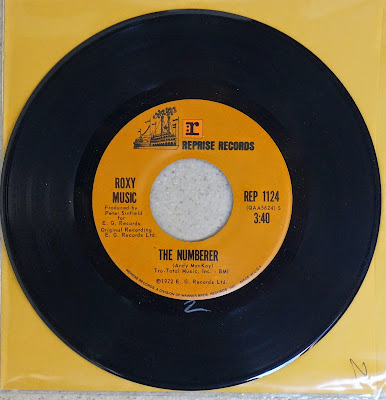Roxy Music was one of my favorite bands of the 70's. Huge in England, their popularity didn't really cross the Atlantic.
My prog loving friends criticized them for not being very good musicians. I couldn't disagree, but it really didn't matter. Does playing intricate arrangements carry more of an emotional wallop than the riff from Jumpin' Jack Flash? Not in my book.
I was attracted to their entire approach. They were a band of contrasts. The drummer (Paul Thompson) played hard and loud as though he was in a heavy metal band. Their sax player (Andy McKay) tended to push his instrument to the extreme. (Outside the band, he was responsible for the sax solo on Mott the Hoople's 'All the Way From Memphis'). Throw in Eno who 'treated' existing instruments to achieve new and interesting tones. Throw in a guitar player (Phil Manzanera) who grew up in South America and brought a somewhat latin influence to his rock playing. On top of that, we get a tuxedo clad singer (Bryan Ferry) who crooned like Bing Crosby.
They were very generous with their B-Sides. Most of which were never released in the USA.
1. The Numberer (B-Side of Virginia Plain) 1972
Technically a stand alone single as it wasn't included on the European release of the first album. In the USA, Virginal Plain was included. The record company released a single and included the original B-Side. The Numberer is an instrumental with a bit of sax and synth flourishes.
2. Pyjamarama b/w The Pride and the Pain. 1973
A standalone single in the UK. Pyjamarama didn't appear on an LP until the live take on Viva! a few years later.
The Pride and the Pain is an instrumental with a dirge like pace. It features wind and bird noises, a clarinet playing a vaguely Middle Eastern melody, searing guitar, whip noises, and a heavenly chorus.
3. Hula Kula (B-Side of Street Life) 1973
Eno is now gone. Roxy Music carries on with the release of their third album, Stranded.
Hula Kula, an instrumental, features Phil Manzanera's workout on a Hawaiian slack key guitar.
4. Your Application's Failed (B Side of All I Want Is You) 1974.
Roxy Music carries on with the release of their fourth album Country Life. The A side was pulled from that album. The B-Side, Your Application's Failed, is a rockin' (almost) instrumental credited to the drummer. Bryan Ferry steps forward with the sole vocal, stating the song's title at the end of a solo break.
5. Sultanesque (B-Side of Love is the Drug). 1975
1975 saw the release of the fifth Roxy Music album, Siren. This one took a step or two towards a fairly mainstream sound and included their first 'hit' in the USA, Love is the Drug. The B-Side, Sultanesque, consists solely of Bryan Ferry doodling on a synthesizer with a drum machine.
6. For Your Pleasure (live) (B-Side of Both Ends Burning) 1975
A second single taken from Siren. The B-Side is live take of a song from the second Roxy Music album. For Your Pleasure had the coveted place in their live show as the last song before the (rock concert cliche) fake encore break. Each musician departs the stage one by one until there's just a drone left. The drone continues while the audience yells for more.
I tend to use this as a restroom break so I don't have to wait in huge lines when the entire arena empties out. There is usually time to get back to my seat before the first notes of the fake encore.
After the release of a live album from the Siren tour, Roxy Music went on hiatus. When they returned a few years later, their sound was less edgy, but still interesting. A good chunk of the 'new wave' artists that dominated MTV in the early days took their cues from Roxy Music. In my humble opinion, they only cared about the surface image, not the musical contrast of the musicians that made Roxy Music great.
After the hiatus, they continued with the B-Sides. I will cover those in Part 2























